Religions of East Asia: Confucianism, Daoism, and Buddhism Solutions
VerifiedAdded on 2022/08/11
|5
|1387
|21
Essay
AI Summary
This essay explores the application of East Asian religious philosophies, specifically Confucianism, Daoism, and Buddhism, to address a moral problem: a friend's fear of failing exams. The author draws upon teachings and practices from these traditions to offer advice and potential solutions. The essay begins by discussing the concept of 'qi' and meditation practices within Daoism and Buddhism, suggesting techniques to manage stress and improve focus. It then delves into Confucian ethics, emphasizing the importance of filial piety and parental guidance. The paper incorporates references to primary sources and relevant academic literature to support its arguments, ultimately aiming to demonstrate how these religious perspectives can offer practical strategies for overcoming personal challenges and achieving success. The essay concludes with a reflection on how East Asian religions can provide valuable insights and support in difficult situations.
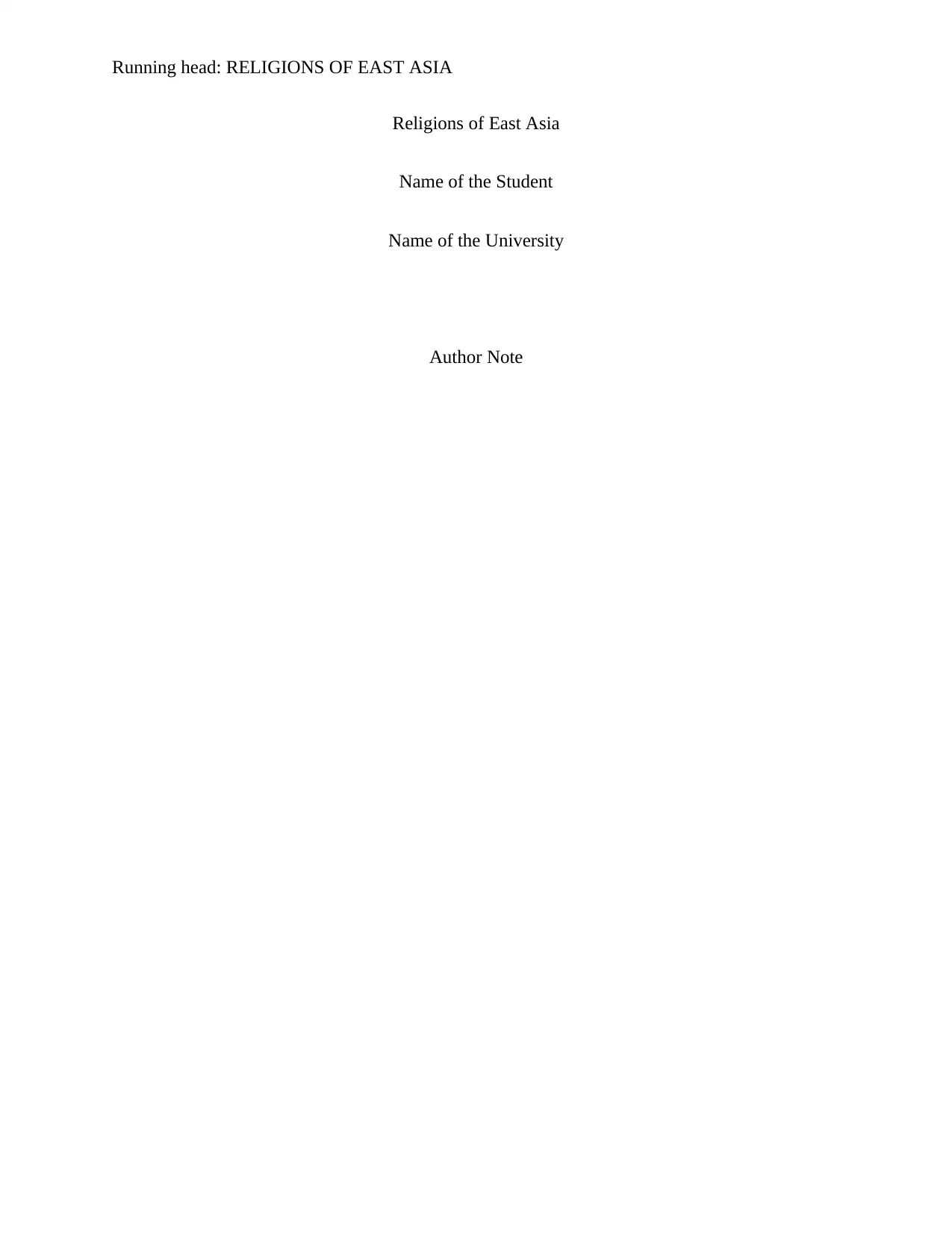
Running head: RELIGIONS OF EAST ASIA
Religions of East Asia
Name of the Student
Name of the University
Author Note
Religions of East Asia
Name of the Student
Name of the University
Author Note
Paraphrase This Document
Need a fresh take? Get an instant paraphrase of this document with our AI Paraphraser
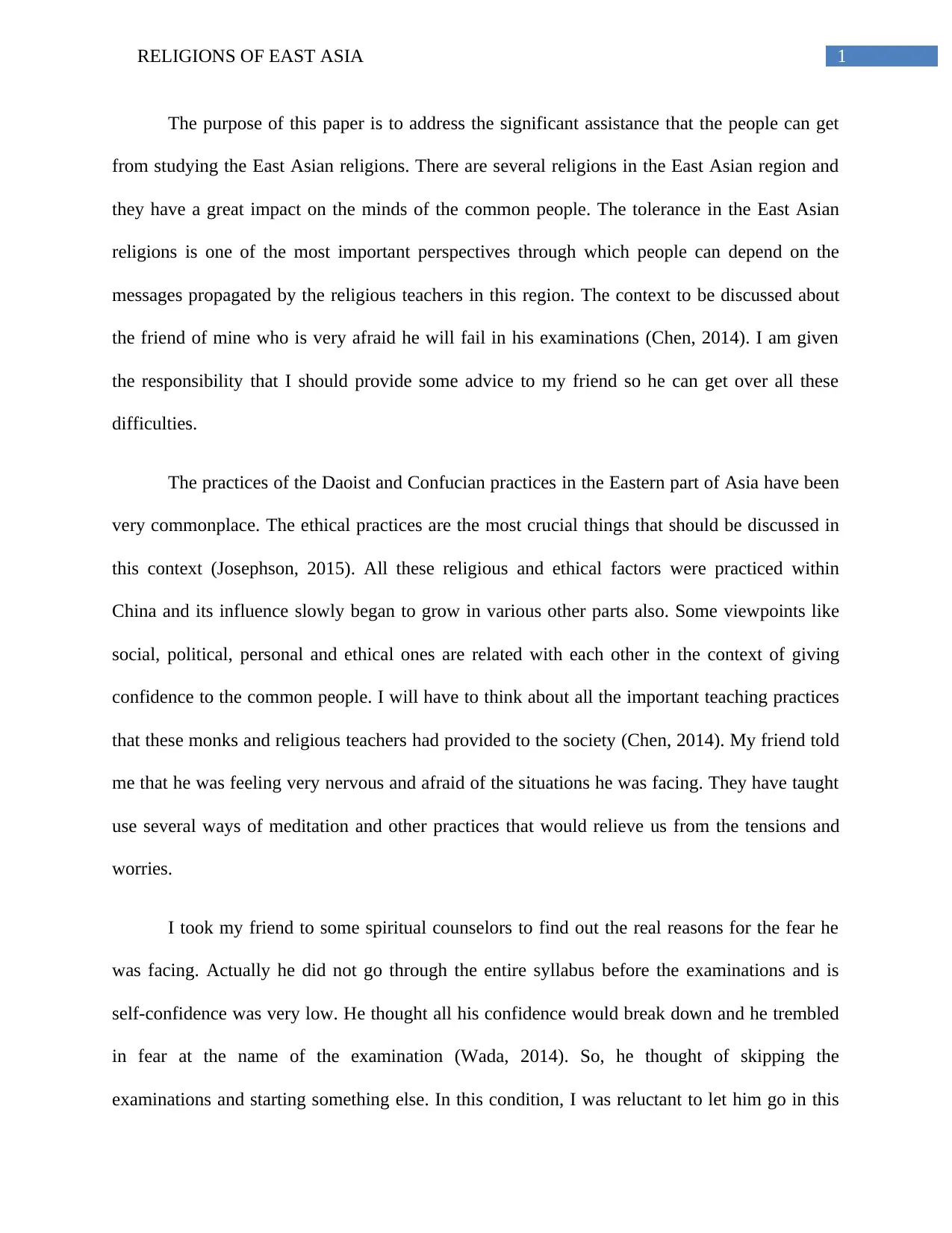
1RELIGIONS OF EAST ASIA
The purpose of this paper is to address the significant assistance that the people can get
from studying the East Asian religions. There are several religions in the East Asian region and
they have a great impact on the minds of the common people. The tolerance in the East Asian
religions is one of the most important perspectives through which people can depend on the
messages propagated by the religious teachers in this region. The context to be discussed about
the friend of mine who is very afraid he will fail in his examinations (Chen, 2014). I am given
the responsibility that I should provide some advice to my friend so he can get over all these
difficulties.
The practices of the Daoist and Confucian practices in the Eastern part of Asia have been
very commonplace. The ethical practices are the most crucial things that should be discussed in
this context (Josephson, 2015). All these religious and ethical factors were practiced within
China and its influence slowly began to grow in various other parts also. Some viewpoints like
social, political, personal and ethical ones are related with each other in the context of giving
confidence to the common people. I will have to think about all the important teaching practices
that these monks and religious teachers had provided to the society (Chen, 2014). My friend told
me that he was feeling very nervous and afraid of the situations he was facing. They have taught
use several ways of meditation and other practices that would relieve us from the tensions and
worries.
I took my friend to some spiritual counselors to find out the real reasons for the fear he
was facing. Actually he did not go through the entire syllabus before the examinations and is
self-confidence was very low. He thought all his confidence would break down and he trembled
in fear at the name of the examination (Wada, 2014). So, he thought of skipping the
examinations and starting something else. In this condition, I was reluctant to let him go in this
The purpose of this paper is to address the significant assistance that the people can get
from studying the East Asian religions. There are several religions in the East Asian region and
they have a great impact on the minds of the common people. The tolerance in the East Asian
religions is one of the most important perspectives through which people can depend on the
messages propagated by the religious teachers in this region. The context to be discussed about
the friend of mine who is very afraid he will fail in his examinations (Chen, 2014). I am given
the responsibility that I should provide some advice to my friend so he can get over all these
difficulties.
The practices of the Daoist and Confucian practices in the Eastern part of Asia have been
very commonplace. The ethical practices are the most crucial things that should be discussed in
this context (Josephson, 2015). All these religious and ethical factors were practiced within
China and its influence slowly began to grow in various other parts also. Some viewpoints like
social, political, personal and ethical ones are related with each other in the context of giving
confidence to the common people. I will have to think about all the important teaching practices
that these monks and religious teachers had provided to the society (Chen, 2014). My friend told
me that he was feeling very nervous and afraid of the situations he was facing. They have taught
use several ways of meditation and other practices that would relieve us from the tensions and
worries.
I took my friend to some spiritual counselors to find out the real reasons for the fear he
was facing. Actually he did not go through the entire syllabus before the examinations and is
self-confidence was very low. He thought all his confidence would break down and he trembled
in fear at the name of the examination (Wada, 2014). So, he thought of skipping the
examinations and starting something else. In this condition, I was reluctant to let him go in this
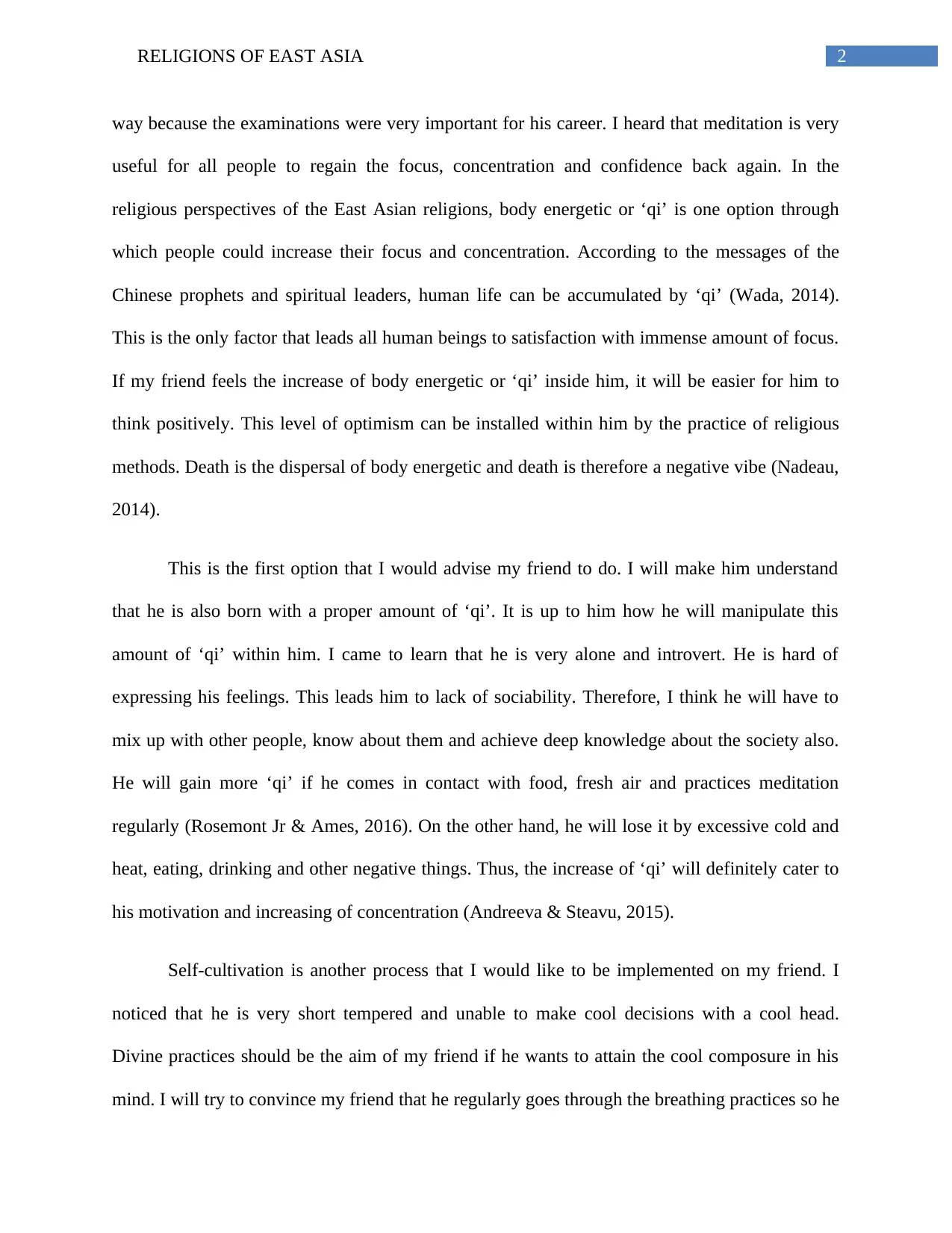
2RELIGIONS OF EAST ASIA
way because the examinations were very important for his career. I heard that meditation is very
useful for all people to regain the focus, concentration and confidence back again. In the
religious perspectives of the East Asian religions, body energetic or ‘qi’ is one option through
which people could increase their focus and concentration. According to the messages of the
Chinese prophets and spiritual leaders, human life can be accumulated by ‘qi’ (Wada, 2014).
This is the only factor that leads all human beings to satisfaction with immense amount of focus.
If my friend feels the increase of body energetic or ‘qi’ inside him, it will be easier for him to
think positively. This level of optimism can be installed within him by the practice of religious
methods. Death is the dispersal of body energetic and death is therefore a negative vibe (Nadeau,
2014).
This is the first option that I would advise my friend to do. I will make him understand
that he is also born with a proper amount of ‘qi’. It is up to him how he will manipulate this
amount of ‘qi’ within him. I came to learn that he is very alone and introvert. He is hard of
expressing his feelings. This leads him to lack of sociability. Therefore, I think he will have to
mix up with other people, know about them and achieve deep knowledge about the society also.
He will gain more ‘qi’ if he comes in contact with food, fresh air and practices meditation
regularly (Rosemont Jr & Ames, 2016). On the other hand, he will lose it by excessive cold and
heat, eating, drinking and other negative things. Thus, the increase of ‘qi’ will definitely cater to
his motivation and increasing of concentration (Andreeva & Steavu, 2015).
Self-cultivation is another process that I would like to be implemented on my friend. I
noticed that he is very short tempered and unable to make cool decisions with a cool head.
Divine practices should be the aim of my friend if he wants to attain the cool composure in his
mind. I will try to convince my friend that he regularly goes through the breathing practices so he
way because the examinations were very important for his career. I heard that meditation is very
useful for all people to regain the focus, concentration and confidence back again. In the
religious perspectives of the East Asian religions, body energetic or ‘qi’ is one option through
which people could increase their focus and concentration. According to the messages of the
Chinese prophets and spiritual leaders, human life can be accumulated by ‘qi’ (Wada, 2014).
This is the only factor that leads all human beings to satisfaction with immense amount of focus.
If my friend feels the increase of body energetic or ‘qi’ inside him, it will be easier for him to
think positively. This level of optimism can be installed within him by the practice of religious
methods. Death is the dispersal of body energetic and death is therefore a negative vibe (Nadeau,
2014).
This is the first option that I would advise my friend to do. I will make him understand
that he is also born with a proper amount of ‘qi’. It is up to him how he will manipulate this
amount of ‘qi’ within him. I came to learn that he is very alone and introvert. He is hard of
expressing his feelings. This leads him to lack of sociability. Therefore, I think he will have to
mix up with other people, know about them and achieve deep knowledge about the society also.
He will gain more ‘qi’ if he comes in contact with food, fresh air and practices meditation
regularly (Rosemont Jr & Ames, 2016). On the other hand, he will lose it by excessive cold and
heat, eating, drinking and other negative things. Thus, the increase of ‘qi’ will definitely cater to
his motivation and increasing of concentration (Andreeva & Steavu, 2015).
Self-cultivation is another process that I would like to be implemented on my friend. I
noticed that he is very short tempered and unable to make cool decisions with a cool head.
Divine practices should be the aim of my friend if he wants to attain the cool composure in his
mind. I will try to convince my friend that he regularly goes through the breathing practices so he
⊘ This is a preview!⊘
Do you want full access?
Subscribe today to unlock all pages.

Trusted by 1+ million students worldwide
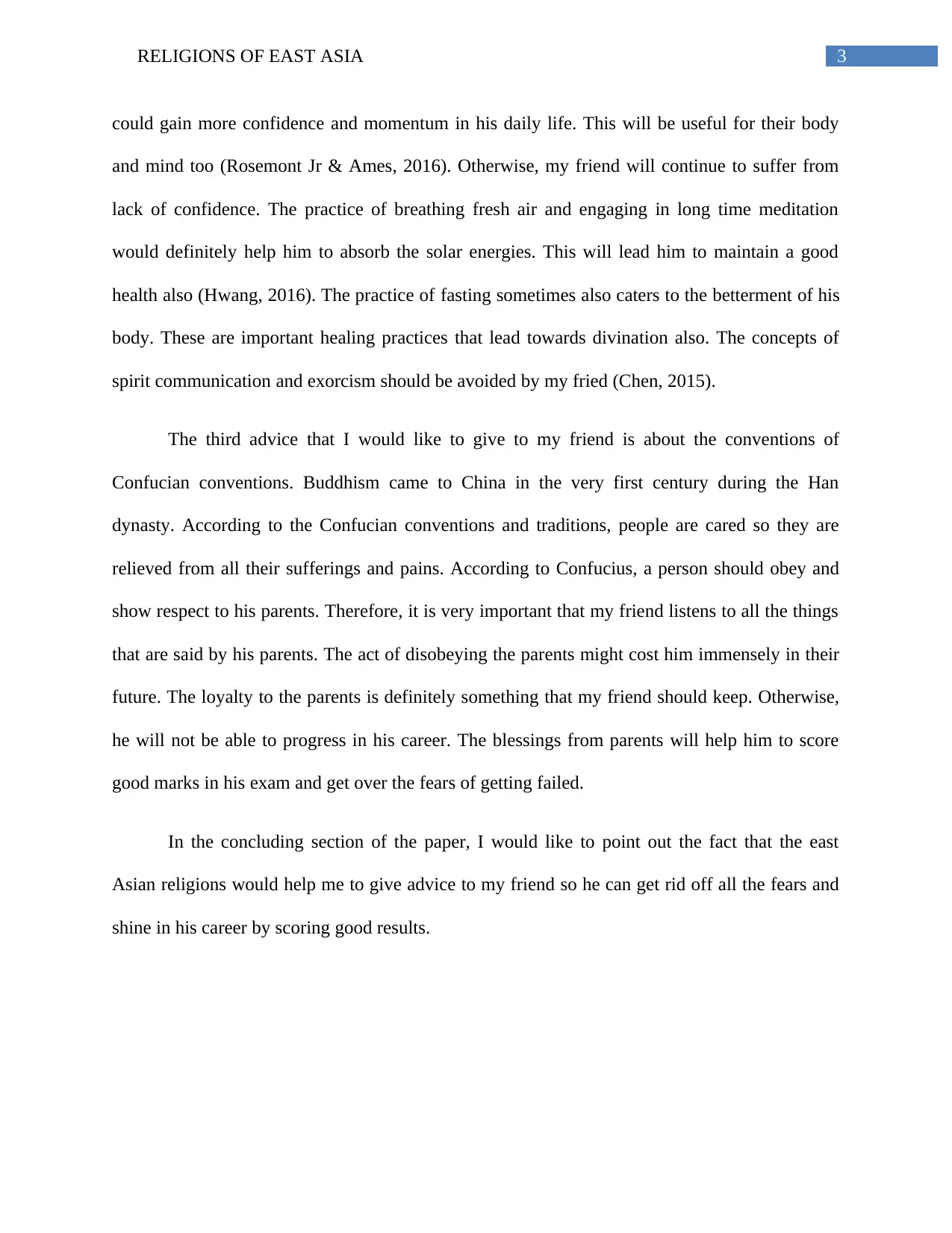
3RELIGIONS OF EAST ASIA
could gain more confidence and momentum in his daily life. This will be useful for their body
and mind too (Rosemont Jr & Ames, 2016). Otherwise, my friend will continue to suffer from
lack of confidence. The practice of breathing fresh air and engaging in long time meditation
would definitely help him to absorb the solar energies. This will lead him to maintain a good
health also (Hwang, 2016). The practice of fasting sometimes also caters to the betterment of his
body. These are important healing practices that lead towards divination also. The concepts of
spirit communication and exorcism should be avoided by my fried (Chen, 2015).
The third advice that I would like to give to my friend is about the conventions of
Confucian conventions. Buddhism came to China in the very first century during the Han
dynasty. According to the Confucian conventions and traditions, people are cared so they are
relieved from all their sufferings and pains. According to Confucius, a person should obey and
show respect to his parents. Therefore, it is very important that my friend listens to all the things
that are said by his parents. The act of disobeying the parents might cost him immensely in their
future. The loyalty to the parents is definitely something that my friend should keep. Otherwise,
he will not be able to progress in his career. The blessings from parents will help him to score
good marks in his exam and get over the fears of getting failed.
In the concluding section of the paper, I would like to point out the fact that the east
Asian religions would help me to give advice to my friend so he can get rid off all the fears and
shine in his career by scoring good results.
could gain more confidence and momentum in his daily life. This will be useful for their body
and mind too (Rosemont Jr & Ames, 2016). Otherwise, my friend will continue to suffer from
lack of confidence. The practice of breathing fresh air and engaging in long time meditation
would definitely help him to absorb the solar energies. This will lead him to maintain a good
health also (Hwang, 2016). The practice of fasting sometimes also caters to the betterment of his
body. These are important healing practices that lead towards divination also. The concepts of
spirit communication and exorcism should be avoided by my fried (Chen, 2015).
The third advice that I would like to give to my friend is about the conventions of
Confucian conventions. Buddhism came to China in the very first century during the Han
dynasty. According to the Confucian conventions and traditions, people are cared so they are
relieved from all their sufferings and pains. According to Confucius, a person should obey and
show respect to his parents. Therefore, it is very important that my friend listens to all the things
that are said by his parents. The act of disobeying the parents might cost him immensely in their
future. The loyalty to the parents is definitely something that my friend should keep. Otherwise,
he will not be able to progress in his career. The blessings from parents will help him to score
good marks in his exam and get over the fears of getting failed.
In the concluding section of the paper, I would like to point out the fact that the east
Asian religions would help me to give advice to my friend so he can get rid off all the fears and
shine in his career by scoring good results.
Paraphrase This Document
Need a fresh take? Get an instant paraphrase of this document with our AI Paraphraser
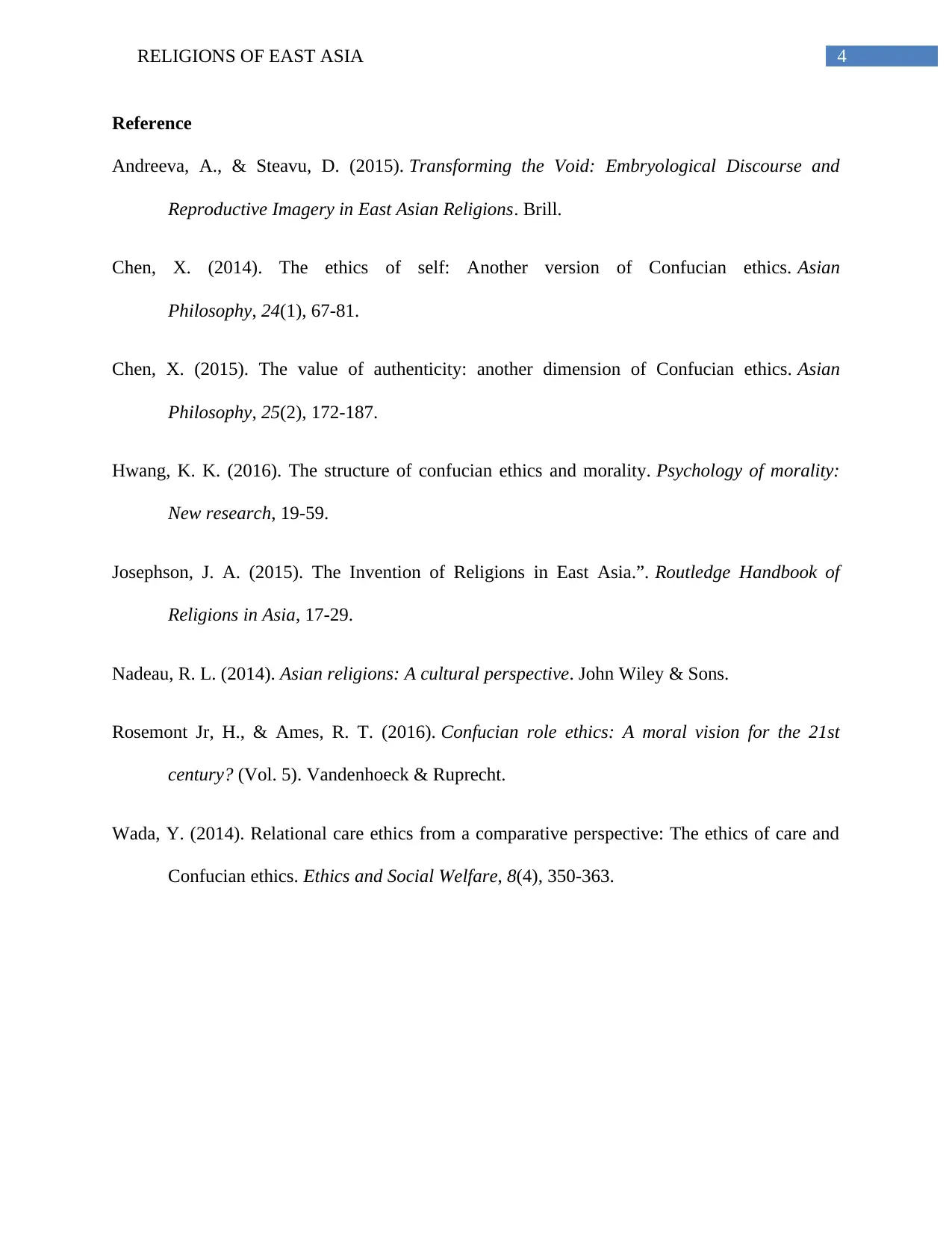
4RELIGIONS OF EAST ASIA
Reference
Andreeva, A., & Steavu, D. (2015). Transforming the Void: Embryological Discourse and
Reproductive Imagery in East Asian Religions. Brill.
Chen, X. (2014). The ethics of self: Another version of Confucian ethics. Asian
Philosophy, 24(1), 67-81.
Chen, X. (2015). The value of authenticity: another dimension of Confucian ethics. Asian
Philosophy, 25(2), 172-187.
Hwang, K. K. (2016). The structure of confucian ethics and morality. Psychology of morality:
New research, 19-59.
Josephson, J. A. (2015). The Invention of Religions in East Asia.”. Routledge Handbook of
Religions in Asia, 17-29.
Nadeau, R. L. (2014). Asian religions: A cultural perspective. John Wiley & Sons.
Rosemont Jr, H., & Ames, R. T. (2016). Confucian role ethics: A moral vision for the 21st
century? (Vol. 5). Vandenhoeck & Ruprecht.
Wada, Y. (2014). Relational care ethics from a comparative perspective: The ethics of care and
Confucian ethics. Ethics and Social Welfare, 8(4), 350-363.
Reference
Andreeva, A., & Steavu, D. (2015). Transforming the Void: Embryological Discourse and
Reproductive Imagery in East Asian Religions. Brill.
Chen, X. (2014). The ethics of self: Another version of Confucian ethics. Asian
Philosophy, 24(1), 67-81.
Chen, X. (2015). The value of authenticity: another dimension of Confucian ethics. Asian
Philosophy, 25(2), 172-187.
Hwang, K. K. (2016). The structure of confucian ethics and morality. Psychology of morality:
New research, 19-59.
Josephson, J. A. (2015). The Invention of Religions in East Asia.”. Routledge Handbook of
Religions in Asia, 17-29.
Nadeau, R. L. (2014). Asian religions: A cultural perspective. John Wiley & Sons.
Rosemont Jr, H., & Ames, R. T. (2016). Confucian role ethics: A moral vision for the 21st
century? (Vol. 5). Vandenhoeck & Ruprecht.
Wada, Y. (2014). Relational care ethics from a comparative perspective: The ethics of care and
Confucian ethics. Ethics and Social Welfare, 8(4), 350-363.
1 out of 5
Your All-in-One AI-Powered Toolkit for Academic Success.
+13062052269
info@desklib.com
Available 24*7 on WhatsApp / Email
![[object Object]](/_next/static/media/star-bottom.7253800d.svg)
Unlock your academic potential
Copyright © 2020–2026 A2Z Services. All Rights Reserved. Developed and managed by ZUCOL.
